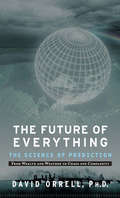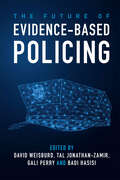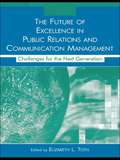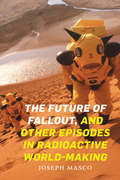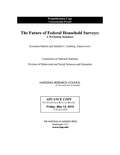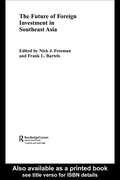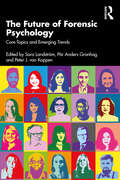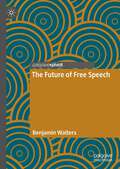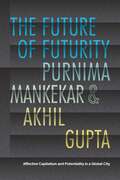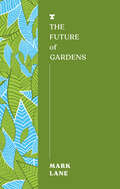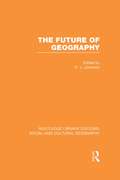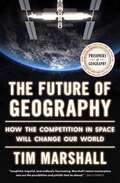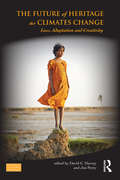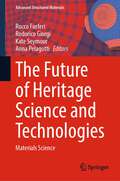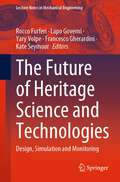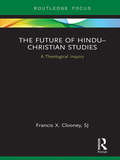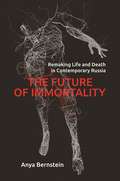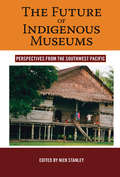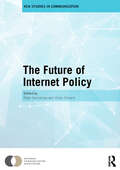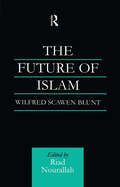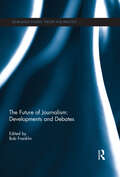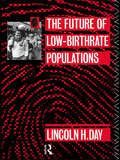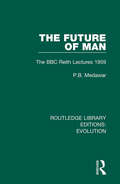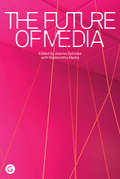- Table View
- List View
The Future of Everything: The Science of Prediction
by David OrrellFor centuries, scientists have strived to predict the future. But to what extent have they succeeded? Can past events-Hurricane Katrina, the Internet stock bubble, the SARS outbreak-help us understand what will happen next? Will scientists ever really be able to forecast catastrophes, or will we always be at the mercy of Mother Nature, waiting for the next storm, epidemic, or economic crash to thunder through our lives? In The Future of Everything, David Orrell looks back at the history of forecasting, from the time of the oracle at Delphi to the rise of astrology to the advent of the TV weather report, showing us how scientists (and some charlatans) predicted the future. How can today’s scientists claim to anticipate future weather events when even thee-day forecasts prove a serious challenge? How can we predict and control epidemics? Can we accurately foresee our financial future? Or will we only find out about tomorrow when tomorrow arrives?
The Future of Evidence-Based Policing
by David Weisburd Tal Jonathan-Zamir Gali Perry Badi HasisiEvidence-based policing (EBP) has become a key perspective for practitioners and researchers concerned with the future of policing. This volume provides both a review of where evidence-based policing stands today and a consideration of emerging trends and ideas likely to be important in the future. It includes comparative and international contributions, as well as researcher and practitioner perspectives. While emphasizing traditional evidence-based methods and approaches, the book also identifies barriers to the advancement of evidence-based policing and expands the vision of evidence-based policing by critically examining ethical and moral concerns and questions. The book's main focus is not on what has to happen in police agencies to advance EBP, but rather on an issue that has received far less attention - the science that is necessary to produce for EBP to be successfully integrated into policing.
The Future of Excellence in Public Relations and Communication Management: Challenges for the Next Generation (Routledge Communication Series)
by Elizabeth L. TothThe Future of Excellence in Public Relations and Communication Management brings together an outstanding group of public relations scholars and practitioners to consider the indelible theory building in public relations of James E. Grunig and Larissa A. Grunig, who with David M. Dozier, produced the 1992 IABC Excellence Study, a benchmark body of work examining best practices in the public relations field. In this assembled collection, editor Elizabeth L. Toth and the contributors show how and in what ways the theories of the Excellence Study have developed and changed. They present research that advances excellence theories, adds new dimensions and directions to the excellence theories, and shows how the excellence study has moved on to a global stage. Toth and her colleagues challenge future researchers to continue the theory-building that will lead to understand how strategic public relations management contributes to organizations and society. Public relations and communication management scholars, in addition to practitioners and graduate students studying these areas, will benefit immensely from the work included here.
The Future of Fallout, and Other Episodes in Radioactive World-Making
by Joseph MascoIn The Future of Fallout, and Other Episodes in Radioactive World-Making Joseph Masco examines the strange American intimacy with and commitment to existential danger. Tracking the simultaneous production of nuclear emergency and climate disruption since 1945, he focuses on the psychosocial accommodations as well as the technological revolutions that have produced these linked planetary-scale disasters. Masco assesses the memory practices, visual culture, concepts of danger, and toxic practices that, in combination, have generated a U.S. national security culture that promises ever more safety and comfort in everyday life but does so only by generating and deferring a vast range of violences into the collective future. Interrogating how this existential lag (i.e., the material and conceptual fallout of the twentieth century in the form of nuclear weapons and petrochemical capitalism) informs life in the twenty-first century, Masco identifies key moments when other futures were still possible and seeks to activate an alternative, postnational security political imaginary in support of collective life today.
The Future of Federal Household Surveys
by The National Academy of SciencesIncreasing cost and declining response rates are two of the problems facing US federal government household surveys that led the Census Bureau to call for the workshop. It was held in November 2010, and though no consensus was reached, there was much sharing of views and ideas among statisticians in a number of agencies. Among the areas summarized here are sampling frames, the collection of household data, small-area estimation, survey content, and next steps. There is no index. Annotation ©2012 Book News, Inc. , Portland, OR (booknews. com)
The Future of Foreign Investment in Southeast Asia (Routledge International Business in Asia)
by Nick J. Freeman Frank L. BartelsThis book explains the dynamics behind southeast Asia's foreign investment activity, and looks at the region's options for reviving its reputation as an attractive host for foreign investors. Each chapter focuses on a key element; together, they portray southeast Asia's foreign investment profile and prospects. By bringing these key interlocking elements together under a single cover, the book aims to provide a more profound understanding of the challenges southeast Asian countries face in their on-going attempts both to attract new foreign investment inflows and to continue hosting substantial existing foreign-invested assets.
The Future of Forensic Psychology: Core Topics and Emerging Trends
by Pär Anders Granhag Sara Landström Peter J. van KoppenThe Future of Forensic Psychology: Core Topics and Emerging Trends is an authoritative text that presents state-of-the-art research from rising stars in the field. Presented in an accessible way, it draws on cutting-edge research to analyse both core topics and current trends in forensic psychology. Borne out of the internationally recognized House of Legal Psychology doctorate programme, the book features eighteen authors from different international contexts who evaluate current and emerging topics in the field. The book is divided into three sections; eyewitness memory and testimony, investigative interviewing and, deception detection and legal decision making. Each section contains in-depth research and includes classics topics such as factors affecting eyewitnesses and determining deceit in investigations. The book also covers newer exciting developments within the field, including credibility in asylum contexts, alibies and cross-cultural aspect of interviewing. Offering an insightful summary of the field today, this book is an indispensable read for students and researchers of forensic psychology, legal psychology and criminology. It will also be of great interest to practitioners in the judicial system.
The Future of Free Speech
by Benjamin WaltersThis book dives headfirst into the contemporary controversy over the limits of free speech. Changing conceptions of what constitutes legitimate harm coupled with the advent of the internet and social media have provided a challenging environment for defining the boundaries of acceptable speech in our contemporary society. This book argues that these problems emerge due to flaws in our free speech framework, leaving the argument for free speech vulnerable to becoming inverted into a justification for censorship. In response, this book argues for a version of free speech based on a framework of toleration. Drawing on the work of the philosopher Rainer Forst, a new justification for free speech is formulated – reflexive freedom of speech – which aims to overcome past issues and justify free speech in a way that is universal, consistent and just.
The Future of Futurity: Affective Capitalism and Potentiality in a Global City (The Lewis Henry Morgan Lectures)
by Purnima Mankekar Akhil GuptaIn The Future of Futurity, Purnima Mankekar and Akhil Gupta examine the lives and experiences of call center agents in India’s business process outsourcing (BPO) industry, who live in Bengaluru and work for customers in the Global North. Mankekar and Gupta show how futurity—an affective-temporal potentiality and mode of being that emphasizes the unfolding of time—enables BPO workers to strive for hopeful futures despite their experiences of growing inequality, volatility, and violence. Drawing on long-term fieldwork with managers, owners, and workers of BPO companies, the authors explore how workers find pathways for navigating a globalized world and for imagining their futures in it. They point to the heterogeneous lives, yearnings, and anxieties of BPO workers, foregrounding the disjunctions and conjunctions between labor, corporeality, intimacy, family life, and mobility. Mankekar and Gupta show how workers’ daily lives and imaginings of the future point to the relationships between futurity, capital, and technology as well as futurity’s imbrications with contemporary racial capitalism. In so doing, the authors insist on the transformative potential of futurity even in conditions of extreme precarity.
The Future of Gardens (The FUTURES Series)
by Mark LaneA bold new look at the changes confronting gardening — including climate change and AI — by acclaimed horticulturalist, TV host, and disabilities activist Mark Lane . . . .Gardening is about choices. Which plants to choose for your soil type and conditions? Where to place them to maximise their growth? What to feed them, and when to water them? And how can all of this be done in a sustainable way? In The Future of Gardens, broadcaster and designer Mark Lane examines present-day considerations alongside those gardeners will need to make in the future.As Earth heats up and populations soar, water will become scarcer on many parts of the planet, and efficient management of it will be key: drought-tolerant planting and smart irrigation systems will likely become commonplace, as will vertical and otherwise space-restricted gardening. And as our world faces stressed or collapsing ecosystems, gardens will be crucial in improving wildlife populations – but only if we let them.Tech will play its part, too. AI-powered apps already provide tips to the green-fingered, but its dominance is a concern. How might we find a happy coexistence? Lane also imagines the potential for gardening in space: what challenges will interstellar travellers face as they cultivate plants on spacecrafts, or even on distant worlds?The Future of Gardens looks at this evergreen discipline with a bold, vibrant and inquisitive eye. Lane&’s own vision for inclusivity, sustainable practice and forward-looking design shines throughout this extraordinary addition to the FUTURES series.
The Future of Geography (Routledge Library Editions: Social and Cultural Geography)
by R. J. JohnstonThe chapters in this book address fundamental questions of the nature and purpose of geography, scrutinising its contents, philosophy and methodology. Aimed at undergraduates its purpose is to broaden the debate about what geography had become during the 1980s and what shape it might take in the future.
The Future of Geography: How the Competition in Space Will Change Our World (Politics of Place #4)
by Tim MarshallFrom the New York Times bestselling author of Prisoners of Geography and leading geopolitics expert comes an &“insightful, hopeful, and endlessly fascinating&” (Daily Express) book on today&’s space race—including the increasingly tense power struggle between the US, China, and Russia and what it means for all of us here on Earth.Spy satellites orbiting the moon. Space metals worth more than most countries&’ GDP. People on Mars within the next ten years. This isn&’t science fiction—it&’s reality. Humans are venturing up and out, and we&’re taking our competitive spirit with us. Soon, what happens in space will shape human history as much the mountains, rivers, and seas have impacted civilizations around the world. It&’s no coincidence that Russia, China, and the USA are leading the way. The next fifty years will change the face of global politics and the world order as we know it. In this must-read work, bestselling author Tim Marshall navigates the new astropolitical reality to show how we got here and where we&’re heading. Extensively researched, &“thought-provoking&” (Popular Science), and drawing on the latest information from intelligence, government, and civilian institutions, this book provides a detailed, clear account of the new space race, the power rivalries, and how technology, economics, and war have a ripple effect on everyone across the globe. Written with all the insight and wit that have made Marshall one of the world&’s most popular and trusted writer on geopolitics, The Future of Geography is an essential read about global power, politics, and the future of humanity.
The Future of Heritage as Climates Change: Loss, Adaptation and Creativity (Key Issues in Cultural Heritage)
by David Harvey Jim PerryClimate change is a critical issue for heritage studies. Sites, objects and ways of life all are coming under threat, requiring alternative management, or requiring specific climate change adaptation. Heritage is key to interpreting the societal significance of climate change; notions (and images) of the past are crucial to our understanding of the present, and are used to prompt actions that help society define and achieve a specific and desired future. Relatively little attention has been paid to the critical intersections between heritage and climate change. The Future of Heritage as Climates Change frames the intellectual context within which heritage and climate change can be examined, presenting cases and sub-fields in which the heritage-climate change nexus is being examined and provides synthetic analyses through five overarching themes: The heritage of change among coastal communities: liminality and the politics of engagement Dwelling materials: processes and possibilities; Environmental heritage: meanings of the past – prospects for the future; Blurring the boundaries of nature and culture: the politics of anticipation; Climate change and heritage practice: adaptation and resilience. The Future of Heritage as Climates Change provides scholars, managers, policy makers and students with a much needed examination of heritage and climate change to help make critical decisions in the next several decades.
The Future of Heritage Science and Technologies: Materials Science (Advanced Structured Materials #179)
by Rocco Furferi Rodorico Giorgi Kate Seymour Anna PelagottiThis book presents selected work from the Florence Heri-Tech, a conference focused on the use of innovative technologies and methods for analyzing, managing, and preserving cultural heritage. This book presents chapters on the chemical and physical advancement in the development of new materials and methods for the conservation and restoration of cultural heritage. It also covers trends in conservation and restoration technology: biotechnology, nanotechnology, tailored materials, and physical technologies. The reader also finds information on methods and instruments for the conservation diagnosis and treatments.
The Future of Heritage Science and Technologies: Design, Simulation and Monitoring (Lecture Notes in Mechanical Engineering)
by Rocco Furferi Lapo Governi Yary Volpe Francesco Gherardini Kate SeymourThis book gathers a selection of contributions dealing with the application of mechanical engineering for preserving and managing cultural heritage. It covers advanced techniques for 3D survey, modeling and simulation, reconstruction, data management as well as advanced diagnostics and testing methods. It highlights strategies to foster sustainability, inclusivity, energy saving and waste reuse in preventive conservation of historical buildings and sculptures, and large heritage sites. Based on contributions presented at the 3rd Florence Heri-Tech International Conference, held on May, 16-18, 2022, in Firenze, Italy, this book offers a timely source of information concerning engineering methods in heritage for both researchers and professionals in the field.
The Future of Hindu–Christian Studies: A Theological Inquiry
by Francis X. ClooneyThe field of Hindu-Christian studies revives theology as a particularly useful interreligious discipline. Though a sub-division of the broader Hindu-Christian dialogue, it is also a distinct field of study, proper to a smaller group of religious intellectuals. At its best it envisions a two-sided, mutual conversation, grounded in scholars’ knowledge of their own tradition and of the other. Based on the Westcott-Teape Lectures given in India and at the University of Cambridge, this book explores the possibilities and problems attendant upon the field of Hindu-Christian Studies, the reasons for occasional flourishing and decline in such studies, and the fragile conditions under which the field can flourish in the 21st century. The chapters examine key instances of Christian–Hindu learning, highlighting the Jesuit engagement with Hinduism, the modern Hindu reception of Western thought, and certain advances in the study of religion that enhance intellectual cooperation. This book is a significant contribution to a sophisticated understanding of Christianity and Hinduism in relation. It presents a robust defense of comparative theology and of Hindu-Christian Studies as a necessarily theological discipline. It will be of wide interest in the fields of Religious Studies, Theology, Christianity and Hindu Studies.
The Future of Immortality: Remaking Life and Death in Contemporary Russia (Princeton Studies in Culture and Technology #23)
by Anya BernsteinA gripping account of the Russian visionaries who are pursuing human immortalityAs long as we have known death, we have dreamed of life without end. In The Future of Immortality, Anya Bernstein explores the contemporary Russian communities of visionaries and utopians who are pressing at the very limits of the human.The Future of Immortality profiles a diverse cast of characters, from the owners of a small cryonics outfit to scientists inaugurating the field of biogerontology, from grassroots neurotech enthusiasts to believers in the Cosmist ideas of the Russian Orthodox thinker Nikolai Fedorov. Bernstein puts their debates and polemics in the context of a long history of immortalist thought in Russia, with global implications that reach to Silicon Valley and beyond. If aging is a curable disease, do we have a moral obligation to end the suffering it causes? Could immortality be the foundation of a truly liberated utopian society extending beyond the confines of the earth—something that Russians, historically, have pondered more than most? If life without end requires radical genetic modification or separating consciousness from our biological selves, how does that affect what it means to be human?As vividly written as any novel, The Future of Immortality is a fascinating account of techno-scientific and religious futurism—and the ways in which it hopes to transform our very being.
The Future Of Indigenous Museums
by Nick StanleyIndigenous museums and cultural centres have sprung up across the developing world, and particularly in the Southwest Pacific. They derive from a number of motives, ranging from the commercial to the cultural political (and many combine both). A close study of this phenomenon is not only valuable for museological practice but, as has been argued, it may challenge our current bedrock assumptions about the very nature and purpose of the museum. This book looks to the future of museum practice through examining how museums have evolved particularly in the non-western world to incorporate the present and the future in the display of culture. Of particular concern is the uses to which historic records are put in the service of community development and cultural renaissance.
The Future of Internet Policy
by Peter Decherney and Victor PickardAll of the short essays in this volume look past the rhetoric of technological determinism and reliance on the natural logic of the market to consider the power of law and policy to steer new media in one direction or another. Many of the essays look backwards through history or outwards across national borders. They all look forward to how today’s policies will shape the future of the internet and society. A particular focus of interest for some of the contributors is the revelations that followed Edward Snowden’s mass disclosure of classified documents in 2013, which revealed the U.S. National Security Agency’s systematic and longstanding program of monitoring global communications. Some chapters consider different countries’ varying approaches to regulating the proliferation of online communication, while others assess the current state of digital technology. They all call for policy interventions to solve market failures. This book was originally published as a special issue of Critical Studies in Media Communication.
The Future of Islam: A New Edition
by Wilfred Scawen BluntWhen it first appeared in 1882, this book was a pioneering work in every respect. It was the first coherent study of 'modern' Islam, explaining in a simple and functional manner its tenets and roots, the diversity of its cultural and political experience, and its dynamism and potential for good in the modern world. This was at a time when the Muslim world was perceived by most people in the west as inert and spent, caught in an irredeemable malaise of its own making. Blunt's attitude, shaped by several factors and sharpened by personal knowledge of important parts of the Muslim world and close association with many leading reformers in it, was unprecedented and startling at the time. This new edition includes an Introduction and numerous footnotes, updating statistics, explaining the background to historical events and religious and political figures, and filling in gaps.
The Future of Journalism: Developments and Debates (ISSN)
by Bob FranklinThe Future of Journalism: Developments and Debates analyses the radical shifts in journalism which are changing every aspect of the gathering, reporting and reception of news. The drivers of these changes include the rapid innovations in communication technologies, the competitive and fragmenting markets for audiences and advertising revenues, and the collapse of traditional business models for financing media organisations, as well as changing audience requirements for news, the ways in which it is presented and the expansive number of (increasingly mobile) devices on which it is produced and consumed. Each of these trends has significant implications for journalists - for their jobs, workplaces, products and perceptions of their professional roles, ethical judgements and day-to-day practice. They also pose significant challenges for the future funding of a sustainable, critical and high ‘quality’ democratic journalism. The Future of Journalism: Developments and Debates comprises the research-based responses of distinguished academic specialists and professional journalists to the challenging issues involved in assessing the future of journalism. It is essential reading for everyone interested in the changing role of journalism in the economic, democratic and cultural life of communities locally, nationally and globally.This book was originally published as two special issues of Journalism Studies and Journalism Practice.
The Future of Looking Back
by Richard BanksWhat will we leave behind in this new digital age? As digital technology takes an ever-increasing role in our lives, one question is how we'll manage our collections after we're gone. What takes the place of shoeboxes full of pictures and dog-eared record albums? Get an inside look at Microsoft researcher Richard Banks's thinking about how we might manage the digital artifacts and content we're creating now--and how we might pass on or inherit these kinds of items in the future. About the Microsoft Research Series At Microsoft Research, we're driven to imagine and to invent. Our desire is to create technology that helps people realize their full potential, and to advance the state of the art in computer science. The Microsoft Research series shares the insights of Microsoft researchers as they explore the new and the transformative.
The Future of Low Birth-Rate Populations
by Lincoln H. DayFirst Published in 2004. Routledge is an imprint of Taylor & Francis, an informa company.
The Future of Man: The BBC Reith Lectures 1959 (Routledge Library Editions: Evolution #7)
by P.B. MedawarOriginally published in 1960, The Future of Man is a chronicle of Professor Medwar’s Reith lectures of 1959. The book outlines his predictions about the future estate of man, with the ‘process of foretelling, rather than with what is actually foretold’. He asks, can we predict the future size of populations? What is the evidence and theoretical background for the belief that human intelligence is declining? Could human beings become uniformly excellent or is inborn diversity and inequality a necessary part of the texture of human populations? The lectures tried to answer these questions and attempts to end with a definition of the biological standing of man. This book will be of interest to anthropologists, biologists and natural historians.
The Future of Media
by Goldsmiths MediaAn investigation of the future of various media industries and technologies that considers how media shape our future.How do we combat post-truth in the news? Are social media influencers the journalists of today? What is it like to live in a smart city? Does AI really change "everything"? The Future of Media investigates the future of media industries and technologies (journalism, TV, film, photography, radio, publishing, social media), while exploring how media shape our future—on a political, economic, cultural and individual level. Issues of diversity, media reform, labour, activism and art take the discussion into a wider social context. Through this, the book celebrates the importance and vitality of media in the modern world. The Future of Media is also an experiment in collaborative modes of thinking and working. Co-authored by theorists and practitioners from one of the world&’s most established media departments, it offers a radical, creative and critical take on media industries—and on world affairs.
